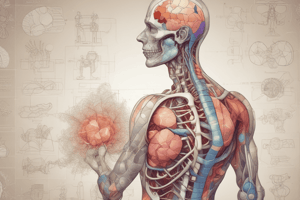Podcast
Questions and Answers
Which mineral is the most abundant in the human body, making up 1.5 – 2% of the body weight?
Which mineral is the most abundant in the human body, making up 1.5 – 2% of the body weight?
- Potassium
- Calcium (correct)
- Magnesium
- Iron
What is the recommended daily allowance (RDA) of calcium for adults under the age of 50?
What is the recommended daily allowance (RDA) of calcium for adults under the age of 50?
- 1,000 mg/day (correct)
- 2,000 mg/day
- 1,500 mg/day
- 500 mg/day
Which of the following foods is a good source of calcium?
Which of the following foods is a good source of calcium?
- Milk (correct)
- Chicken
- Bananas
- Spinach
Which of the following is involved in the regulation of calcium absorption?
Which of the following is involved in the regulation of calcium absorption?
What is the normal range for total calcium levels in the blood?
What is the normal range for total calcium levels in the blood?
Which of the following is NOT a food source of calcium?
Which of the following is NOT a food source of calcium?
What is the normal range for ionized calcium levels in the blood?
What is the normal range for ionized calcium levels in the blood?
Which hormone is involved in the regulation of calcium absorption?
Which hormone is involved in the regulation of calcium absorption?
What is the recommended daily allowance (RDA) of calcium for postmenopausal women?
What is the recommended daily allowance (RDA) of calcium for postmenopausal women?
Which of the following is NOT a long-term effect of calcium on the body?
Which of the following is NOT a long-term effect of calcium on the body?
Flashcards are hidden until you start studying
Study Notes
Calcium in the Human Body
- Calcium is the most abundant mineral in the human body, constituting 1.5 – 2% of total body weight.
- It plays a crucial role in various physiological functions, including bone health, muscle contraction, and nerve transmission.
Recommended Daily Allowance (RDA)
- The RDA of calcium for adults under the age of 50 is 1,000 mg.
- For postmenopausal women, the RDA increases to 1,200 mg due to changes in bone density.
Dietary Sources of Calcium
- Dairy products, such as milk and cheese, are excellent sources of calcium.
- Leafy greens, almonds, and fortified foods can also contribute to daily calcium intake.
Regulation of Calcium Absorption
- Vitamin D is essential for the regulation of calcium absorption in the intestines.
- Adequate levels of vitamin D help maintain optimal calcium levels in the body.
Normal Calcium Levels
- Total calcium levels in the blood typically range from 8.5 to 10.2 mg/dL.
- Ionized calcium levels, which reflect the active form of calcium in the blood, should be between 4.5 and 5.6 mg/dL.
Non-Sources of Calcium
- Foods such as meat, grains, and certain fats are generally not recognized as significant sources of calcium.
- Understanding food sources is vital for maintaining healthy dietary practices.
Long-term Effects of Calcium
- Calcium is important for maintaining bone density and preventing osteoporosis, but it does not directly influence weight loss or muscle gain as a long-term effect.
- A balanced diet combined with physical activity yields overall health benefits rather than focusing solely on calcium.
Studying That Suits You
Use AI to generate personalized quizzes and flashcards to suit your learning preferences.




